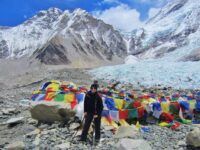How to Choose the Right Sherpa Guide for Your Everest Base Camp Expedition

So as far as deciding on the best possible Sherpa guide to Everest Base Camp was concerned, it was indeed a huge decision with monumental consequences on if or how your journey is going alongside yours. On this treacherous journey, Sherpas, deep knowledge of the terrain, high altitude expertise, and cultural insight make them invaluable companions. Here are a few considerations when choosing a guide to make sure you’re well-supported during your journey.
Everest Base Camp Trek Guide One of the key qualities you should look for in a guide is years of experience on the Everest Base Camp route. An experienced Sherpa guide already knows the nooks and crannies of the trail, how local weather works, and how to maneuver within high-altitude environmental conditions. They also know how to identify signs of altitude sickness early and how to prevent it.
A Sherpa guide’s qualifications and certification also count. A lot of guides receive specialized training in first aid, high-altitude trekking, and mountain safety — vital skills for managing emergencies. Ask about the guide’s certifications before booking, along with any added skills, like speaking several languages, that will further enhance communication during the trek.
Another major factor is what your chemistry with the guide will be like. A good Sherpa guide should be friendly, patient, and supportive. Everest Base Camp Trekker can be a physically challenging hike, and a guide who knows how to encourage you while maintaining a cool and positive attitude can mean everything. It also helps if the guide has a thorough knowledge of Sherpa culture and can share information about local traditions, monasteries, and communities along the trail.
Lastly, but certainly one of the most important aspects of any tour is the reputation of the tour guide or the tour company that takes you on the tour. Read reviews, seek recommendations, and speak with previous trekkers to understand the level of service and experience you’ll receive. Hiring a suitable Sherpa guide is more than safety; it adds depth and taken a certain extent an account to your best Everest Base Camp trek experience.
How to Hire a Sherpa Guide in 6 Easy Steps
EBC Trek One of the most pivotal decisions for any aspiring Halo hiker should include hiring a Sherpa guide. Sherpas: Highly trained local guides, these are the unsung heroes of any trek in the Himalayas. The deep knowledge of the terrain, cultural expertise, and physical ability of the porters in high-altitude landscapes make them priceless to trekkers. Not only will having a Sherpa with you navigate the best path through treacherous terrain, but they will ensure your safety and health, as well as offer invaluable advice on proper acclimatization and problem-solving. Considering the demanding nature of the trek, taking a Sherpa brings many benefits, first and foremost peace of mind since he can foresee and deal with any eventuality. A good sherpa is also a cultural ambassador and you’ll get an insight into the local Sherpa way of life and the rich history of the area. So armed with their experience and support, trekkers have some serious peace of mind, knowing they can just enjoy the journey ahead with confident hands behind guiding.
Hiring a Sherpa Guide for the Everest Base Camp Trek
The Everest Base Camp Trek is a strenuous endeavor that travels through high-altitude landscapes, meaning that a Sherpa guide is vital. Sherpas are not only experienced climbers, but they also know the Everest territory like the back of their hand. Their experience guides trekkers through rough, even dangerous, terrain, particularly in inclement weather. They facilitate acclimatization, an essential step in preventing altitude sickness. They also bring a valuable cultural element to the experience, as they provide trekkers with insight into the Sherpa lifestyle and the region’s history, drawing on their extensive knowledge of local customs and traditions. Sherpas also help keep a comfortable pace, making sure the trek is safe as well as pleasant. Since they are so used to the hard conditions, they can handle unforeseen challenges that can arise, whether it is health issues or logistical problems. Hence IFFICENT Everest Base Camp Trek, we cover a part of this trek, then hiring a Sherpa guide is not a luxury but a must to make your adventure truly unique, safe, and successful.
Sherpa Guide Qualifications and Experience
Sherpa guides are famous for their strength, endurance, and knowledge of high-altitude trekking. Most Sherpas have lived their whole lives in the Khumbu region, and their intimate knowledge of the Everest region, its trail, and its weather patterns has no equal. The physical capability of a Sherpa guide is just one aspect of their qualifications. They were usually subjected to intense training — high-altitude trekking, mountaineering, long-distance hiking, first aid. Many Sherpas are certified through organizations like the Nepal Mountaineering Association, meaning they have a strong understanding of safety measures, rescue processes, and environmentally sustainable practices. Experience is another important reason — many Sherpas have served as guides for decades, shepherding trekkers and climbers on Everest expeditions. A Sherpa guide with very good experience will be able to analyze the weather conditions, control acclimatization at high altitudes,and handle any challenges encountered on the way. As a result, hiring a Sherpa guide is one of the best investments you can make for the safety and enjoyment of your Everest Base Camp Trek, given this combination of qualifications, experience, and local knowledge.
What to Expect from a Sherpa while Trekking.
The Sherpa guide has multiple roles during the Everest Base Camp Trek. First and foremost, they are there for your safety, to keep you on the right track, to help you deal with the challenges of high-altitude trekking, and to acclimatize you to avoid altitude sickness. Sherpas are trained in altitude trekking best practices, and understand how to combat high-altitude risks like hypothermia and dehydration. They also offer great insight into the culture, religion, and history of the Sherpa people. They can also guide trekkers to religious sites, like monasteries, and provide context for different traditions. On a much more practical level, Sherpas help with logistics so that the trek goes without a hitch, aiding in the arrangement of permits, lodging, and meals. And they help lug heavy loads, so trekkers can be freer and more focused on the adventure. As such, Sherpas provide emotional and psychological support during the entire trek. The knowledge of having these guides by your side ensures that difficult moments are filled with comfort and it’s all to ensure treks are allowed to catch the tangled fibers of doubt in their box of mental positivity.
Checking the Sherpa’s Certifications and Training
Everest Trek It’s important to ask for a Sherpa guide and be sure to verify their certifications and training. Sherpas receive specialized training with organizations such as the Nepal Mountaineering Association (NMA) or the Himalayan Rescue Association. These certifications ensure that the Sherpa is trained in high-altitude trekking, mountaineering basics, and first-aid, allowing them to handle medical emergencies and assist in navigating rough terrains. In addition to being aware of the environment, many Sherpas take classes on environmental conservation to be knowledgeable about sustainable trekking. And be sure to ask your trekking company or Sherpa guide for proof of these credentials. Experience is also a key factor in assessing a Sherpa’s proficiency, aside from certifications. Many of the most experienced Sherpas have spent years, if not decades, guiding trekkers up Everest and other high-altitude treks. Seek experienced guides with positive testimonials from previous customers. Checking a Sherpa’s certifications and experience means that you’re getting someone who can help make your trek safer, smoother, and more enjoyable.
Secondary language skills and communication
Language All forms of trekking adventure require effective communication and an important consideration of hiring a Sherpa is to ensure that they have strong communication skills. Most Sherpas will speak their native language, Sherpa, but they are commonly multilingual, and being in the trekking industry in Nepal, almost all Sherpas speak English. An experienced guide with strong language skills will be able to communicate safety guidelines clearly, give helpful information on the trek, and help in an emergency. Moreover, speaking English enables trekkers to relate to their guide on a further scale, gaining insight into the local culture, customs, also history of the locale of the Everest region. Although not strictly mandatory, communication in English should be basic in order to facilitate your trekking. Some guides may also be multilingual, and speak other languages relevant to the trekking community. Language proficiency is another important thing to discuss with potential Sherpa guides so that you can be assured that communication will not be a hurdle and that your experience will be informative and enjoyable.
Trying to determine how well the Sherpa knows the route
Everest Trek Guide The most important quality of a Sherpa guide for your Everest Base Camp trek is their knowledge of the route. An experienced Sherpa perspective of the Everest area may be the distinguishing factor in a smooth, successful journey. It is not an easy journey to Base Camp, as they must traverse over different terrains, weather, and altitudes that can be tricky to navigate without careful experience, but with local knowledge. A seasoned Sherpa guide will know the safest routes, where to rest, and when patterns of wind and weather have shifted.
Pick a sherpa based on questions about their past trekking experience, Everest base camp treks in particular. Inquire about their knowledge of the particular trail, such as if there are difficult areas, how to acclimatize to the altitude, and what to look out for. So it is also worth having a reporter who can explain the logistics of the journey, including places to sleep, ea,t and refill water while on and in transit. They are also usually well-versed in the cultural significance of landmarks and villages you may pass, allowing your trek to be sprinkled with knowledge of the region’s history and traditions.
Having a knowledgeable Sherpa through the Everest Base Camp route can ultimately lead to a smoother and more pleasant experience! They will have the experience and knowledge of the environment to get you safely through the wilderness and over those high-altitude trekking problems.
You are knowledgeable on data till October
When choosing a guide for your Everest Base Camp expedition, the reputation of a Sherpa guide is an essential factor. Years of experience, quality service, and reliability go a long way in building a good reputation. You should research and read reviews by fellow trekkers who have trekked with your potential guide or guiding company before deciding on a digger. Reading testimonials and reviews can provide a glimpse into the professionalism, reliability, and ability of the guide to support trekkers along the way.
EBC with Kala Patthar Well-reputed Sherpas will often find their way to you through word of mouth or reliable travel agencies. Praise for a guide’s punctuality, skill and knowledge of the region can offer confidence you’re in good hands. Notice how previous clients refer to the guide’s professionalism when it comes to safety and communication, and whether they were able to cope with unexpected challenges like bad weather or altitude sickness.
And consider the guide’s connection to the local community. Your well-respected Sherpa should have good ties with the local villages, accommodations, and various trekking people, ensuring that your trek runs smoothly. Also look into whether the Sherpa or guiding company has local affiliation with legitimate trekking nonprofit organizations, as those tend to uphold a standard of professionalism. In the end, a good Sherpa will make your Everest Base Camp trek better by providing you with knowledge, safety, and company along the way.
Comparing Costs and Services
Fortunately, the price ranges and services of various Sherpa guides are reasonable, allowing you to shop around for the best value when planning your Everest Base Camp trek. How much does a Sherpa cost? Sherpa prices tend to vary depending on their experience, trek length, and services provided. Look past just the quoted prices and get a sense of the total service offered by each guide or trekking company.
In many cases, a higher price indicates a guide with more experience, specialized training and extra support such as porters, meals and transportation. Some Sherpa guides also provide additional features such as private housing, tailored itineraries, or scenic tours, which could contribute positively to your experience overall. More affordable options might offer only the essential guide services, with less in the way of extra perks.
Kala Patthar Trek When comparing costs look out for what is included like accommodation, meals, trekking permits , and insurance. Different guides offer different things, some offer everything, while others charge other things separately. Make sure you have a full breakdown of costs before you commit to avoid any unwelcome surprises during your trek.
Cost is a significant consideration in your decision, but it is not the only factor. Prioritize the quality of service, Sherpa experience, and the level of support provided for a safe and enjoyable trek. Finding a balance between cost and quality of services will help you make the right choice to give you an awesome experience on your Everest Base Camp trek.
Setting Up Expectations and Violence
It is important to set expectations and define your role during your Everest Base Camp trek with your Sherpa guide to ensure a smooth and successful trek. Having open discussion from the start prevents misunderstandings and ensures that both parties share the same goals for the trek.
Talk about the overall itinerary and what to expect day by day. Explain how the guide will conduct the trek: Will they navigate the path for you; book your accommodations; keep you safe? If you need focused support — assistance with gear or help managing altitude sickness, for example — communicate these needs early on.
You need to establish the Sherpa’s role in terms of health and safety as well. For example, your guide should be trained in first aid and know how to manage altitude sickness, emergencies, or injuries. Your methods of acclimatization and philosophy of taking rest days, if needed, should also align.
As the journey goes on, keep communicating with your guide about your physical state and how you’re feeling. It is important that you discuss any fears you have openly with them. A professional Sherpa will also prepare you for your role as a trekker — keeping a positive attitude, respecting the local culture, and following the safety guidelines.
By laying down the groundwork for mutual trust and respect from the start, you’ll ensure a seamless and thoroughly enjoyable Everest Base Camp trek.
Security &Emergency Procedures
When selecting a Sherpa guide for your Everest Base Camp trek, safety is the most important consideration, and it is essential that you understand your guide’s safety and emergency protocols before you go. The Everest region poses particular risks, from severe weather to the dangers of altitude sickness, and a good guide properly prepared is the best way to minimize them.
A professional Sherpa will have had training and experience in mountain safety — their training will allow them to spot early signs of altitude sickness, dehydration, or exhaustion. They also should be ready to deal with emergencies, including evacuation if needed. ● Inquire about your guide’s experience leading excursions like yours, and make sure there are clear procedures in place in the event of an injury, severe weather or other emergencies.
Ensure the guide knows well the correct methods of calling in assistance, whether that is communicating with local rescue crews or arranging for helicopter evacuations. A good guide will also have training in first aid and carry at least a basic medical kit, and more serious emergencies may be best handled by professional medical help. Also, should you or the guide need medical assistance, discuss the coverage you have for that as well, as any possible need for air-lifting.
It’s also helpful to lay out your emergency communication options during the trek before heading out. It is especially important for a team in a remote area to have some form of satellite phone or other method of communication should an emergency situation arise. Safety should always remain a guide’s top priority, and a guide with extensive emergency protocols ensures that you’ll be in safe hands throughout your journey, thus giving you peace of mind.
Conclusion: Keys to Picking the Right Sherpa For Your Expedition.
EBC Trekking Selecting the best Sherpa guide for your Everest Base Camp trek is one of the most significant decisions you will make in order to have a safe, enjoyable, and unforgettable journey. The best Sherpa should have years of experience on the Everest route, a strong reputation backed by great reviews, and be dedicated to safety and professionalism. It can be key to gauge those guiding your trip’s trail knowledge, have an understanding of what services are available, and make sure that expectations and responsibilities are agreed upon at the start of a search.
By comparing prices and services, you can help make sure you get the best deal for your trek. The cheapest option is not always the best; ensure you choose someone with experience and expertise, as well as someone safe. By establishing open lines of communication and clearly defining your expectations, you will build a positive relationship throughout the trek.
A high-quality Sherpa guide will lead you safely through the treacherous terrain and will enhance the experience further with knowledge, local perspective , and culturally sensitive information. assembled with an assembly, your Everest Base Camp trek is going to be a day that is memorable, integrated with magnificent landscapes, cultural discoveries, and a profound feeling of fulfillment.





